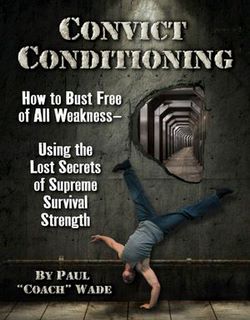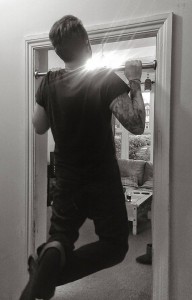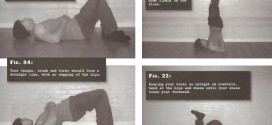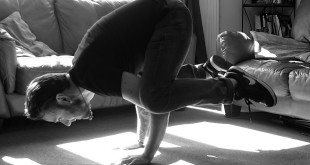 “Convicting Conditioning? I’m going to give you a big fat spoiler up front – I like it a lot. It’s really helped me.”
“Convicting Conditioning? I’m going to give you a big fat spoiler up front – I like it a lot. It’s really helped me.”
Hello, I’m Steve. I recently took up Convict Conditioning, a programme of bodyweight exercises, or calisthenics, as practised in some of the tougher prisons on the North American Subcontinent. It’s practical, methodical and contrary to the popular image of Calisthenics in the 80s there is no prancing about in leotards. The author of the book and founder of Convict Conditioning, Paul ‘Coach’ Wade has spent the best part of 19 years behind lock and key and adapted his strength training to an environment without access to gym machinery or weights. The programme promises a safe path to extreme, practical strength through a progression of bodyweight exercises and has been received to rapturous accolade. Often it’s referred to as the holy grail of calisthenics. So, now that the nametags are written and the exercise confessions made, these are my ramblings on the matter. Obviously these are my thoughts, experiences and opinions, not law!
So you’re curious about Convict Conditioning? Good. You’ll be relieved to hear I’m not going to make you read all the way to the end to see if I like it, I’m going to give you a big fat spoiler up front – I like it a lot. It’s really helped me.
So, who am I? Well, I’m fairly unremarkable, I’m 35 with reasonable cardio fitness, I can run 5km in under 23 minutes on a good day. I’ve not got an especially heavy build but despite the miles in trainers I’m prone to being a bit squidgy around the middle. I started the Convict Conditioning program with a few issues and niggles which we will come to later. Running gives me tendinitis of the ankles, my knees ratchet and ache from the cartilage grinder of kick-boxing (and an almost certainly misguided 100 Burpee challenge last year). Finally, my lower back is prone to being a bit winey, from the classic poor posture and desk job one-two. What surprised me was, in spite of these ailments, how perfect Convict Conditioning turned out for me, but I’m getting ahead of myself.
The Convict Conditioning Philosophy
The full title of Paul Wade’s book is Convict Conditioning: How to Bust Free of All Weakness – Using the Lost Secrets of Supreme Survival Strength but I’ll refer to it as CC from here on. If you live in the UK you will probably struggle to get hold of a hard copy without importing, it seems to circle the £45 mark and takes about 20 days to ship from America where it’s published. Fortunately you can pick up the electronic version immediately for a much more affordable £6.47. No prizes for guessing which way I jumped.
title of Paul Wade’s book is Convict Conditioning: How to Bust Free of All Weakness – Using the Lost Secrets of Supreme Survival Strength but I’ll refer to it as CC from here on. If you live in the UK you will probably struggle to get hold of a hard copy without importing, it seems to circle the £45 mark and takes about 20 days to ship from America where it’s published. Fortunately you can pick up the electronic version immediately for a much more affordable £6.47. No prizes for guessing which way I jumped.
CC gives you no doubts about its roots; it was written in prisons and carries many of Coach Wade’s experiences of life behind bars and inmate traditions of bodyweight exercise regimes. The text is permeated with the ‘get strong or go under’ ethos that likely typified incarcerated life and whereas it’s sometimes quick to remind you of this, there is no doubt that he has paid his dues and served his time. The style of writing is straight down the line, maybe erring on the side of macho from time to time but it never talks down to you and the author always takes time to clearly explain why and how you’re doing something. Yes, I’m perhaps quibbling over writing styles, my point is it might irk you on some level but that doesn’t detract from the validity of the message.
The structure is fairly simple, it opens with an introduction to the philosophy of CC and many of the problems with the ‘fitness traps’ that are modern gyms. In a nutshell Coach Wade argues that much of the modern bodybuilding industry is designed to give short term, superficial gains and feed a market for superfluous products and supplements. He thinks many gyms train the wrong kind of power and in the scrabble for meaningless bulk many are sacrificing practical strength and flexibility along the way.
This section resonated with me; I’ve experienced a lot of different exercises over the years, dabbling with martial arts, running, cycling, swimming, canoeing, rock climbing, bouldering, yoga, and a few more. Gyms however, I struggled to get on with, they seemed strange, smelly places with one corner of scary people banging weights down and shouting at themselves in the mirror (I know that’s not everyone who ‘lifts’). I’d go along in good faith and try pushing some mass around but even with a notebook and a plan it always felt like a hollow pursuit. I’d often get bored of waiting for equipment and end up spending half an hour sweating it out on the heavy bag instead. It’s only after reading that list back I realised I’ve been chasing callisthenics most of my life.
The more perceptive will spot I said “get strong fast” not “get big fast”. CC promises to make you strong (inhumanly so in fact) but in a leaner, practical way that will complement other activities. The mid-section of the book holds the exercises themselves and comprises the bulk of the text. The final chapters lay out training theory and plans detailed enough that even a total newbie can get started safely. One thing I’d strongly advise, if you’re interested in doing this: read it all first. You can’t work through it like a novel, training as you go. It served me so much better to get a top down view of everything before starting.
The Six Exercises and Their Progressions
CC is formed of 6 exercise progressions based on:
- The Pullup
- The Pushup
- The Squat
- The Leg Raise
- The Bridge
- The Handstand Pushup
Each progression has ten steps, starting from a very gentle exercise, ideal for rehabilitation and gently increasing in difficulty until the final ‘Master Step’ – usually something that would curdle the blood of all but a hardened athlete. Take for example the humble pushup, it starts with the gentle standing wall pushup and builds up to the master step of 100 (straight body, feet together) one-arm pushups. You don’t even get down to the floor until step four! But if you do them right, and I wasn’t before reading CC, even kneeling pushups will give your triceps and chest a fair kicking.
In terms of the exercises themselves, each progression series is introduced with a good dollop of anatomical explanation and exercise theory to make it clear why this has a place in CC. Each individual step is laid out in detail with illustrative pictures, entry requirements and training goals to hand. It’s a very methodical approach and I rarely held a doubt about the best execution of an exercise.
Never Skip a Step
It’s emphasised throughout, no matter how strong you are, begin at step one in each series and slowly build perfect biomechanical form, meeting the target reps before progressing to the next exercise. The intention behind this is to re-teach a practitioner the exercise from the ground up with perfect form, rehabilitate old injuries and teach a considered and mindful training mentality.
That’s all for now, next time I’ll talk about how I started out, got settled with an effective plan and stopped my kneecaps from exploding.
STEVE HARVEY
About Steve
Stev e Harvey is a lifelong fitness junkie who believes in working out smarter for the best quality of life. Besides being a total coffee nerd and budding minimalist, he is interested in productivity hacks, cinema and body-sympathetic eating.
e Harvey is a lifelong fitness junkie who believes in working out smarter for the best quality of life. Besides being a total coffee nerd and budding minimalist, he is interested in productivity hacks, cinema and body-sympathetic eating.
 Paleo Minds Paleo diet, fitness and lifestyle.
Paleo Minds Paleo diet, fitness and lifestyle.




